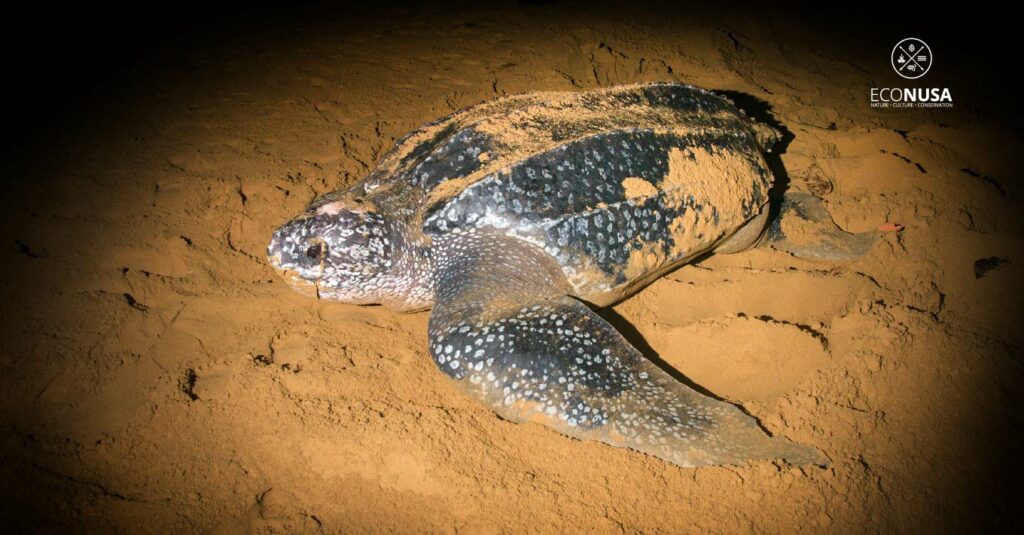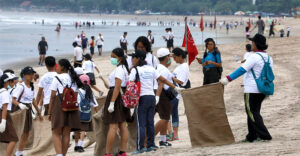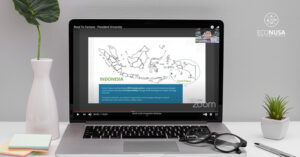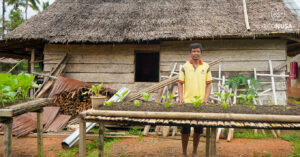
As to Abun Tribe, leatherback turtle (Dermochelys coriacea) is deemed the significant Oceans God that need preservation. The existence of the fauna is believed to bring blessing to the surrounding creature including Abun Tribe, a native tribe dwelling in Abun District, Tambrauw Regency, West Papua. Therefore, Abun Tribe has a locally-called Menke Womom ritual to call turtle to pay a visit on the shoreline particularly to lay their eggs to preserve the population of Oceans God here.
Menke Womom ritual starts from family ritual which has grown into local wisdom performed by the Abun community for a long time. When Abun Tribe feels that the number of leatherback turtle presence on the shoreline diminishes, they will usually hold a Menke Womom ritual in a large scale instead of domestic ritual.
The ritual is usually performed by end of June as the peak season for laying eggs. The day and venue of ritual were defined through a closed-door tribal assembly. Jamurba Medi beach that is currently known as Jeen Womom Beach, and Wormon Beach are the two beaches commonly used as the ritual venues.
Read also: Walking Shark Needs Protecting Due to Ongoing Evolution
Menke Womom ritual normally is held in the late afternoon. It is the time for big sea reptile to land or drop a visit on a coastline in late afternoon. The ritual should be done closely by 13 tribal leaders, and two of them is assigned to call out the Oceans God on the shoreline.
With traditional outfits, the Abun people prepares various elements for ritual. One of them is a pair of coconut midrib with coconut leaves as the ‘tool’ to call turtle. When the sun nearly sets, two Oceans God callers will stand on the shoreline. With afternoon light, they will beat the sea water three times while spelling mantra.
In addition to calling the leatherback turtle, the summoning here is also the form of gratitude of Abun people to the sea for taking care of the Oceans God and providing them with prosperity. When the turtle is coming and landing on the shoreline, it signifies the blessing for Abun people.
Read also: Mandoni Village, Mangrove Crab Village
The leatherback turtle or in Abun language is called womom is the largest and nearly extinct turtle species. Referring to the red list of International Union for Conservation of Nature (IUCN), the species is categorized Vulnerable whose population is in decreasing trend. In Indonesia, the ocean adventurer species here is protected by the Minister of Environment and Forestry regulation P106 Men-LHK/2018 on the Type of Protected Flora and Fauna and Law Number 5/1990 on Conservation of Natural Resource and Ecosystem.
The existence of leatherback turtle is threatened by plastic population on the sea, mangrove clearance on the shorelines, and often by bycatch among fishers who commit catch fisheries that is not sustainable.
Jeen Womom and Wormon Beaches on the bird head of Papua Island is assumed to be on the top three of the largest spots for leatherback turtle eggs laying after Papua New Guinea and Costa Rica.
Read also: Plant Sago, Plant the Future
Based on the document of Jeen Womom Coastal Park Zoning and Management Plan 2016-2035 issued by Tambrauw Regency’s Maritime Affairs and Fisheries Office, in addition to being important habitat for leatherback turtle, Jeen Womom and Wormon Beaches are also the habitat of three other turtle species, namely olive ridley sea turtle (Lepidochelys olivacea), green sea turtle (Chelonia mydas), and hawksbill sea turtle (Eretmochelys imbricata).
The existing Menke Womom ritual is the sign of close ties of Abun Tribe, sea , and turtle. The existence of turtle as god in Abun tradition and culture brings positive impact to the preservation of Abun Tribe in their habitat. This can be seen from the data showing that in a year at least 200 turtles of 15-30 years of age lay their eggs in these beaches.
Menke Womom ritual is part of the way Abun Tribe commits to defend their sea. If sea and turtle are sustainable, the prosperity of human including Abun Tribe will be assured. It is time for us to take part in sea and all sea biodiversity conservation. Articulate your support on Indonesian sea conservation through info.econusa.id/dukungparadise!
Editor: Nur Alfiyah, Leo Wahyudi, Lutfy Putra




